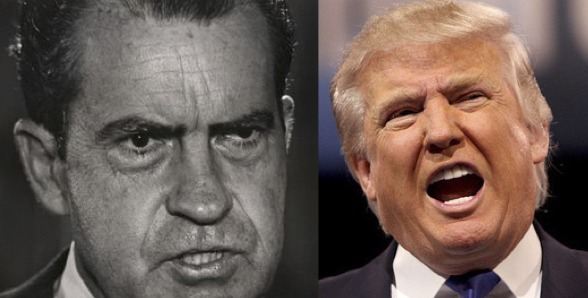Two ironies of history

By the time of the Watergate break-in — 50 years ago this Friday — Richard Nixon’s path to victory was already virtually foreordained. The nomination of George McGovern, Nixon’s ineffectual opponent in the 1972 race for the presidency, was less than a month away. Nixon enjoyed a turbulent but popular incumbency. The Watergate break-in wasn’t merely unnecessary. It was absurdly, ludicrously dangerous. All the work Nixon needed to be re-elected to his final term of office in the last political position he intended to hold was already done. He blew it.
It is one of the great ironies of history that Nixon’s paranoia alone, formed as an excess of caution and a peculiar lack of belief in himself, brought him down. Had he left things as they were, had he not interfered, he would have got his wish and finished out a distinguished political career relatively unscathed. But for his own paranoia Nixon would have been fine.
Donald Trump’s re-election was not so assured. Many doubted that he had what it took to win a second term of office. But nature lent a hand. During his final full year of office, coronavirus became the overriding news story. Donald Trump’s salvation was handed to him, as it were, on a silver platter. He could have united the country behind a common enemy and shown America to be a shining example for the rest of the world.
Though it may seem obviously otherwise these days, there is nothing inherently liberal or conservative about taking Covid-19 seriously. That is, masking up, washing your hands and maintaining social distancing are neither liberal nor conservative things to do. Donald Trump made scoffing at the dangers of Covid all about politics. That is why we have the divide we have today. Had he not done so, had he taken it seriously and pretended to care about the American people, he might have easily won re-election.
But it’s even worse than that. It wasn’t enough that Trump saw coronavirus as a blight on his record and something he needed to sweep under the rug, instead of as an opportunity to unite the country. He also shot himself in the foot with his open discouragement of absentee ballot voting.
While largely ignoring coronavirus, Trump was busy manufacturing the false narrative that the 2020 election was going to be rigged, fully six months before the election itself. In a move of pure political suicide he identified absentee ballots as the major culprit of corruption. That he did so during a pandemic — precisely when absentee voting would be most useful — further fuelled his perceived need to diminish the dangers of Covid.
Trump’s paranoia is what made the so-called “red mirage” all the more dramatic. The red mirage is the illusion that Republicans are winning in early returns. That’s because Republicans are more likely to vote in person than by absentee ballot, so their votes get counted early. This is why any Republican lead will get diminished and even disappear as the absentee votes get tallied.
By identifying absentee ballot voting as the enemy, Trump made the red mirage and the subsequent surge in blue votes later even more prominent. It was why Biden surged ahead to beat him in some states where it looked like Trump was going to win.
So both Nixon and Trump blew it by doing too much here and too little there. In both cases their downfall was caused by their own paranoia and a complete lack of faith in the American system’s ability to do what it always did, deliver a peaceful election that didn’t need to be fiddled with. In the end, Trump and Nixon were their own worst enemies. And, as ever, ladies and gentlemen, brothers and sisters, comrades and friends, stay safe.

Robert Harrington is an American expat living in Britain. He is a portrait painter.
